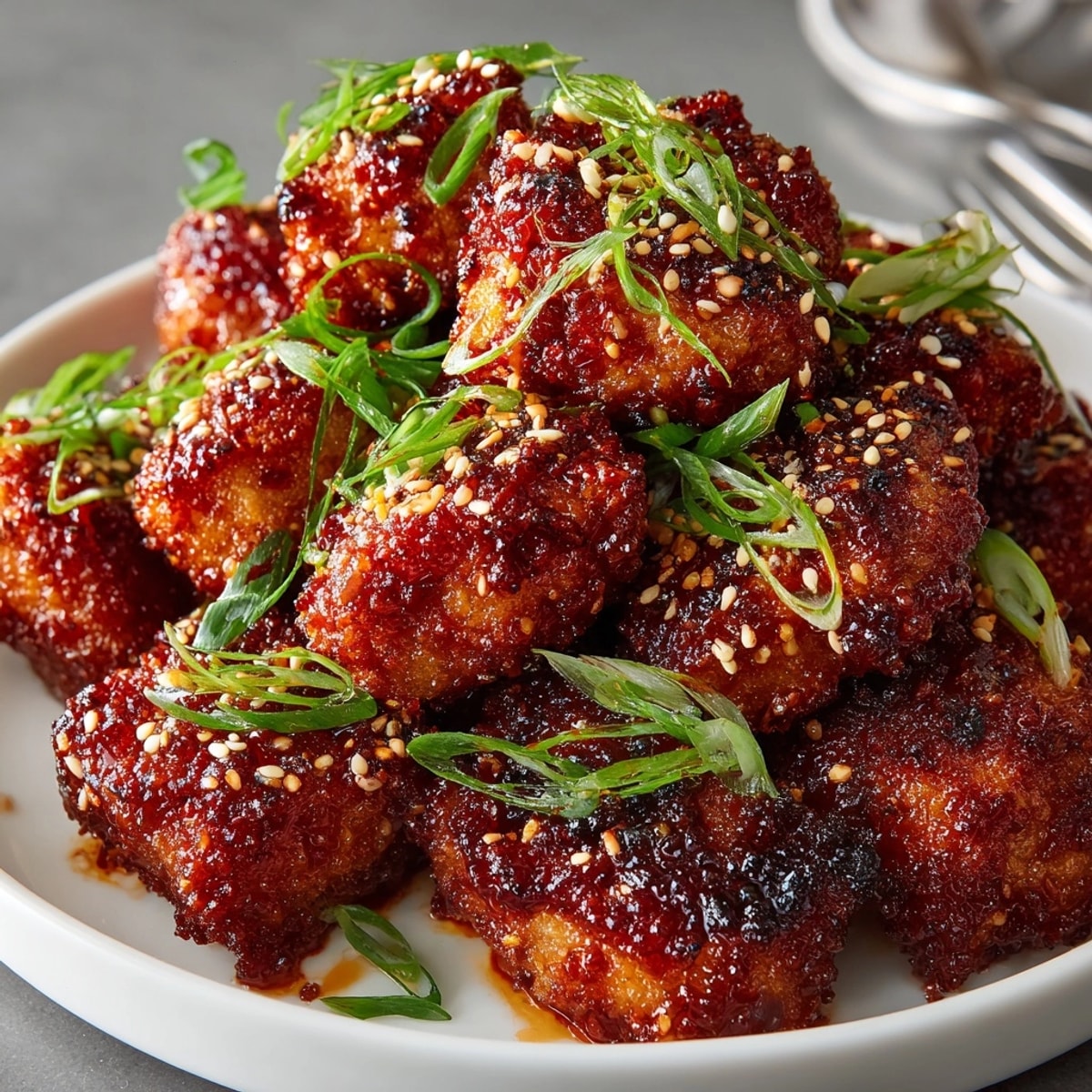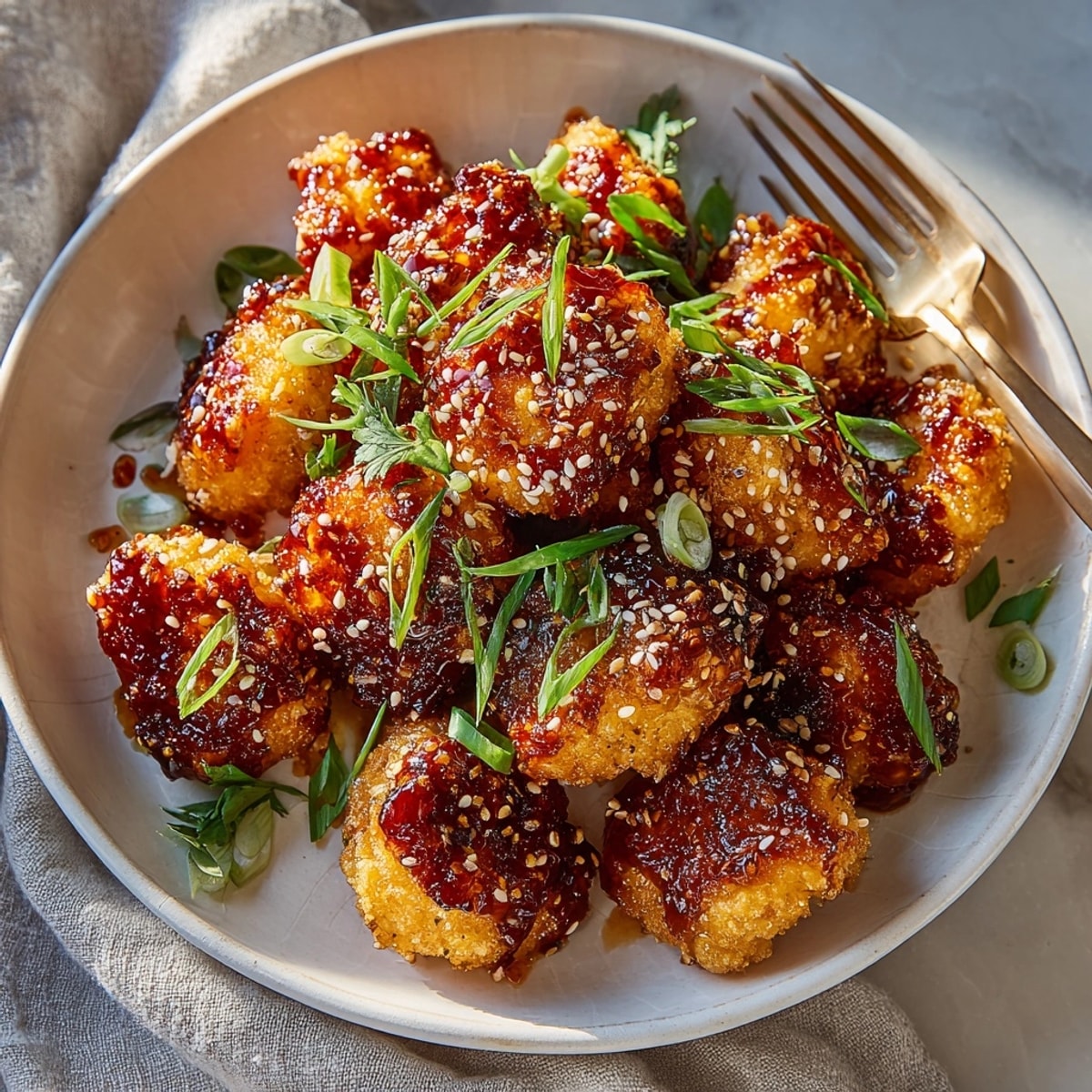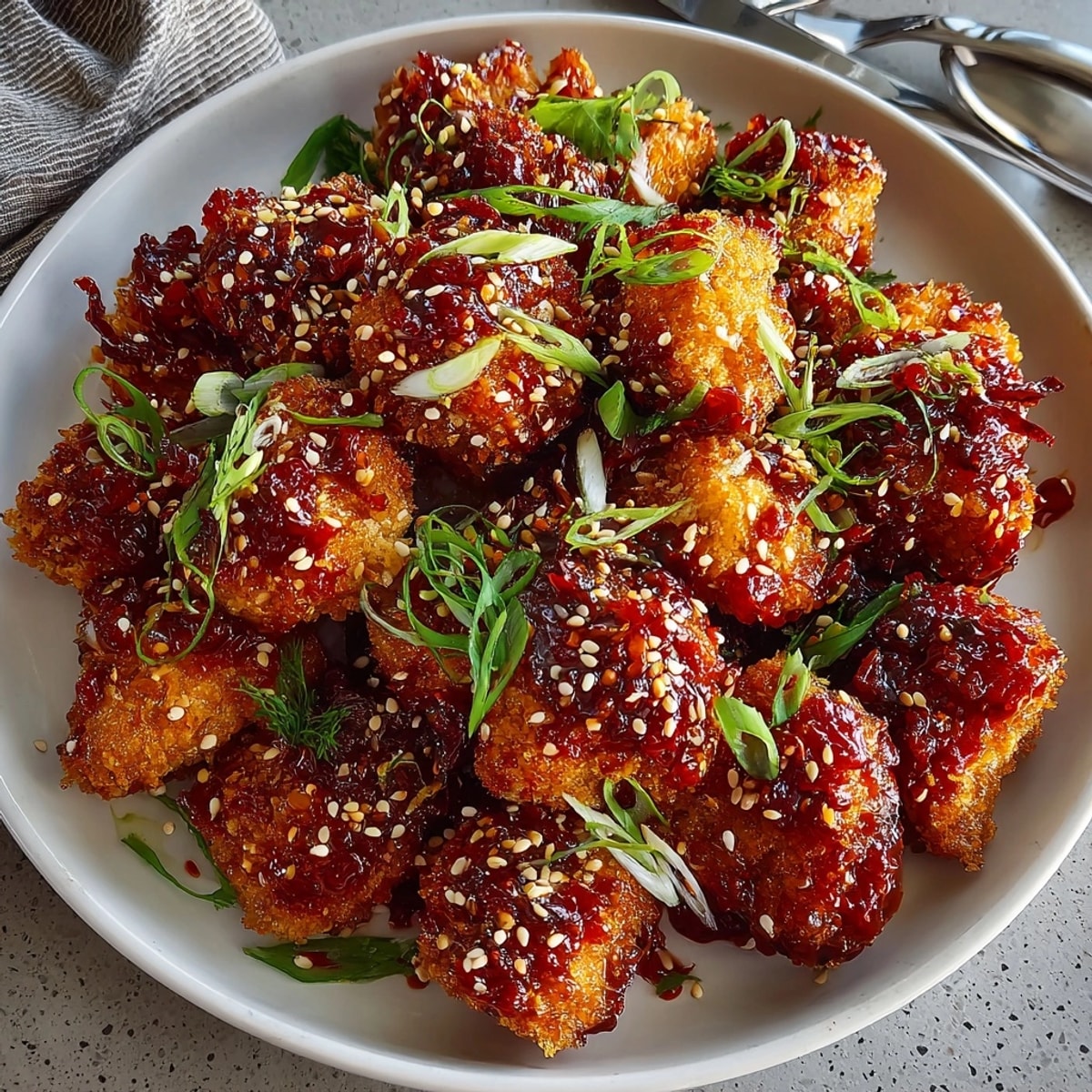 Save
Save This spicy Korean chicken popcorn nugget recipe transforms simple chicken thighs into addictive, bite-sized morsels with a perfect balance of heat and sweetness. The gochujang glaze delivers that unmistakable Korean flavor punch while the double-coating technique ensures maximum crispiness in every bite.
I first made these nuggets for a game night with friends, and they disappeared faster than any other dish I've ever served. Now they're requested at every gathering, and I always make a double batch because they're impossible to resist.
Ingredients
- Boneless skinless chicken thighs cut into 2 cm pieces: Thighs stay juicier and more flavorful than breast meat when fried.
- Soy sauce: Provides the umami foundation for both marinade and glaze. Use low sodium if watching salt intake.
- Rice wine or dry sherry: Adds subtle acidity that tenderizes the chicken. Look for Shaoxing wine for authenticity.
- Fresh garlic and ginger: Create aromatic depth. Always use fresh rather than powdered for vibrant flavor.
- Cornstarch and flour mixture: Creates the perfect light yet crispy coating that holds up to the glaze.
- Gochujang Korean chili paste: Delivers the signature sweet heat. Look for it in Asian markets or international grocery aisles.
- Honey: Balances the heat with natural sweetness. Local honey adds subtle floral notes.
- Toasted sesame oil: Provides nutty depth. A little goes a long way, so measure carefully.
- Sesame seeds and spring onions: Add texture, color and fresh finish. Toast the seeds yourself for maximum flavor.
Instructions

- Marinate the Chicken:
- Combine bite sized chicken pieces with soy sauce, rice wine, minced garlic, grated ginger, and black pepper in a bowl. Allow to marinate for at least 15 minutes, though 30 minutes is ideal for flavor penetration. The acids in the marinade begin tenderizing the meat while the aromatics infuse their flavors throughout.

- Prepare the Coating:
- Mix cornstarch, flour, salt, and white pepper in a wide, shallow bowl. The cornstarch creates extra crispiness while the flour provides structure. White pepper adds subtle heat without visible specks. Make sure all seasonings are evenly distributed throughout the dry mixture.

- Coat the Chicken:
- Working in batches, dredge the marinated chicken pieces thoroughly in the flour mixture. Press firmly to create a substantial coating that will become extra crispy when fried. Shake off any excess coating and set aside on a plate. For extra crunch, let the coated pieces rest for 5 minutes before frying.

- Fry to Perfection:
- Heat vegetable oil in a deep heavy bottomed pan to exactly 180°C or 350°F. Use a kitchen thermometer for accuracy. Fry the chicken in small batches for 4 to 5 minutes until deeply golden and cooked through. Avoid overcrowding which lowers oil temperature and creates soggy coating. Remove with a slotted spoon and drain on paper towels.

- Create the Glaze:
- Combine gochujang, honey, soy sauce, rice vinegar, brown sugar, sesame oil, minced garlic, and grated ginger in a saucepan. Simmer over medium heat for 3 to 4 minutes, stirring constantly until the mixture thickens enough to coat the back of a spoon. The sauce should be glossy and have a pourable but thick consistency.

- Glaze the Nuggets:
- While the glaze is still warm, add the fried chicken nuggets to the pan and toss until every piece is evenly coated with the sticky, spicy sauce. Work quickly to ensure the coating stays crisp. If the glaze becomes too thick, add a teaspoon of water to loosen.

- Garnish and Serve:
- Transfer the glazed nuggets to a serving plate and immediately sprinkle with toasted sesame seeds and sliced spring onions. The heat from the chicken will slightly wilt the onions and release their aroma. Serve immediately while hot and crispy.

 Save
Save The gochujang paste is truly the star ingredient here. I discovered it years ago at a Korean market and now keep it as a pantry staple. Its complex flavor of fermented soybeans, chili, and rice adds a depth that simple hot sauce could never achieve. My children were initially skeptical of the vibrant red color but now request these nuggets weekly.
Storage Tips
These nuggets are best enjoyed immediately after cooking when the contrast between crispy exterior and juicy interior is at its peak. However, if you need to store leftovers, place them in an airtight container in the refrigerator for up to 2 days.
To reheat, avoid the microwave which will make them soggy. Instead, place them on a baking sheet in a 350°F oven for 7-10 minutes until heated through and re-crisped. The glaze may become slightly sticky again as it warms.
For meal prep, you can marinate the chicken up to 24 hours in advance and store the flour mixture separately until ready to cook. The glaze can also be prepared a day ahead and gently reheated before tossing with freshly fried chicken.
Ingredient Substitutions
While authentic ingredients create the best flavor profile, these substitutions work in a pinch:
If you cannot find gochujang, substitute with 1 tablespoon sriracha mixed with 1 tablespoon red miso paste and 1 teaspoon brown sugar. This approximates the fermented, sweet heat of traditional gochujang.
Chicken breast can replace thighs but reduce cooking time by 1 minute to prevent dryness. The texture will be slightly less juicy but still delicious.
For a gluten free version, replace all purpose flour with rice flour and ensure your soy sauce and gochujang are certified gluten free varieties.
Maple syrup makes an excellent substitute for honey, adding a different but complementary sweetness to balance the heat.
Serving Suggestions
These Korean chicken nuggets shine as part of a larger spread. For a Korean inspired feast, serve alongside kimchi, steamed rice, and quick pickled vegetables for a balanced meal with contrasting flavors and textures.
For entertaining, present them on a platter with decorative toothpicks and additional dipping sauces like cooling cucumber yogurt or extra gochujang sauce thinned with a bit of mayo.
These nuggets also make excellent filling for lettuce wraps. Provide butter lettuce leaves, thinly sliced cucumbers, carrots, and extra sauce for guests to build their own handheld treats.
For a fusion twist, use these nuggets as protein in Korean inspired tacos with crunchy slaw, avocado slices, and a drizzle of lime crema.
Cultural Context
Chicken nuggets get a distinctly Korean makeover in this recipe, drawing inspiration from Korean fried chicken, which has gained international popularity for its twice fried technique and addictive glazes.
Traditional Korean fried chicken or "KFC" as it's playfully called in Korea, became popular in the 1970s and is now a beloved part of Korean drinking culture, often enjoyed with cold beer in specialized restaurants called "chimaek" joints (a combination of "chi" from chicken and "maek" from maekju, meaning beer).
The gochujang glaze represents centuries of Korean fermentation tradition. This fermented chili paste has been a staple in Korean kitchens for over 1000 years, providing complex flavor that goes beyond simple heat to deliver umami richness and subtle sweetness.
 Save
Save These nuggets are perfect served hot and crispy as a snack or appetizer. The sweet and spicy glaze makes them incredibly addictive and a guaranteed crowd-pleaser.
Recipe Questions
- → How do I keep the chicken nuggets extra crispy?
Double-fry the chicken by frying once, letting it rest, then frying again briefly before tossing in the glaze for added crunch.
- → Can I adjust the spice level?
Yes, reduce or increase the gochujang in the glaze to suit your preferred level of heat.
- → What is the best oil for frying?
Use a neutral oil with a high smoke point, such as vegetable or canola oil, for deep frying.
- → What can I serve alongside these nuggets?
Pair them with pickled radish, fresh salads, or a chilled drink to balance the heat and flavor.
- → Are these suitable for a gluten-free diet?
They can be made gluten-free by using gluten-free flour, soy sauce, and ensuring the gochujang is certified gluten-free.
- → Can I bake instead of fry?
Baking works but may yield less crispiness; place coated pieces on a rack and bake at a high temperature until golden.